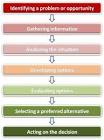Managerial Decision Making Examples: Making Effective Choices in the Workplace
In the fast-paced and dynamic world of business, managers are constantly faced with making decisions that can have a significant impact on their teams, departments, and organizations as a whole. Effective managerial decision making is crucial for achieving success and driving growth. Let’s explore some real-life examples of managerial decision making to understand how it plays out in the workplace.
Resource Allocation:
A manager may be tasked with deciding how to allocate limited resources, such as budget or manpower, across various projects or departments. They need to weigh the potential benefits and risks associated with each option and make an informed choice that maximizes efficiency and supports organizational goals.
For example, a marketing manager might need to decide whether to invest more funds in social media advertising or traditional print media campaigns. By analyzing market trends, target audience preferences, and cost-effectiveness, they can make a decision that optimizes their marketing efforts within the available resources.
Hiring Decisions:
When filling a vacant position within their team, managers must carefully evaluate candidates to find the best fit for the role. They consider factors such as qualifications, experience, cultural fit, and potential for growth.
For instance, a sales manager may have two candidates with similar qualifications but differing personalities. By considering team dynamics and individual strengths, they can choose someone who not only possesses the necessary skills but also complements the existing team members’ abilities.
Crisis Management:
In times of crisis or unexpected challenges, managers must make quick decisions under pressure to mitigate risks and minimize negative consequences. These decisions often require careful evaluation of available information and consideration of both short-term and long-term implications.
For instance, if a manufacturing defect is discovered in a product just before its launch date, a production manager needs to decide whether to delay the launch for quality control or proceed as planned while addressing customer concerns promptly. This decision involves weighing potential financial losses, customer satisfaction, and brand reputation.
Strategic Planning:
Managers play a crucial role in shaping the long-term direction of their organizations. They make decisions about market expansion, product diversification, mergers and acquisitions, and other strategic initiatives.
For example, a CEO might decide to invest in research and development to create innovative products that cater to emerging consumer trends. This decision requires a careful analysis of market demand, competitive landscape, available resources, and potential return on investment.
Performance Evaluation:
Managers are responsible for evaluating employee performance and making decisions regarding promotions, bonuses, or corrective actions. These decisions impact employee motivation, career growth, and overall team dynamics.
For instance, when determining whether to promote an employee to a managerial position, a supervisor considers factors such as leadership skills, decision-making abilities, teamwork capabilities, and past performance. By making fair and objective assessments based on established criteria, they can ensure the right person is placed in a position of greater responsibility.
In conclusion, managerial decision making is an integral part of effective leadership in the workplace. Managers must navigate through various scenarios by considering available information, analyzing potential outcomes, and aligning decisions with organizational goals. By studying real-life examples of managerial decision making like resource allocation, hiring decisions, crisis management, strategic planning, and performance evaluation – managers can enhance their ability to make informed choices that drive success for their teams and organizations as a whole.
5 Essential Tips for Effective Managerial Decision Making
- Consider the long-term implications of your decisions. Think about how they will affect not only your team, but also the larger organization and stakeholders.
- Make sure to consult with relevant stakeholders before making a decision to ensure that all perspectives are taken into account.
- Take time to research and analyze all available data before making a decision, so that you can make an informed choice based on facts rather than assumptions or hunches.
- Be open to feedback from others and be willing to adjust your decisions if necessary in order to achieve the best possible outcome for everyone involved.
- Have a plan for implementation of any decisions made, so that you can ensure they are put into action in an effective manner as soon as possible.
Consider the long-term implications of your decisions. Think about how they will affect not only your team, but also the larger organization and stakeholders.
When it comes to managerial decision making, one crucial tip is to consider the long-term implications of your choices. It’s not just about the immediate impact on your team; it’s about how your decisions will shape the larger organization and impact stakeholders.
Every decision a manager makes has consequences that can ripple throughout the organization. By taking the time to think beyond the present moment, you can make more informed choices that align with the overall goals and values of the company.
For example, let’s say you’re considering implementing a cost-cutting measure that involves reducing employee benefits. While this may seem like a quick solution to save money in the short term, it’s important to consider how this decision will affect employee morale, productivity, and retention in the long run. It may lead to decreased motivation and loyalty among your team members, ultimately impacting overall performance and customer satisfaction.
Additionally, thinking about how your decisions will impact stakeholders is crucial. Stakeholders can include customers, shareholders, suppliers, and even the community at large. Will your decision improve customer experience? Will it enhance shareholder value? Will it foster positive relationships with suppliers? These are all important considerations that should be taken into account.
By considering the long-term implications of your decisions, you demonstrate strategic thinking and a commitment to sustainable success. It allows you to anticipate potential challenges or opportunities that may arise as a result of your choices.
To ensure you’re considering these long-term implications effectively, gather relevant data and consult with key stakeholders before making critical decisions. Seek input from different departments or teams within your organization to gain diverse perspectives and insights.
Remember, as a manager, you have a responsibility not only to your team but also to the larger organization. By taking into account how your decisions will affect everyone involved – from employees to stakeholders – you can make more well-rounded choices that contribute positively to the overall success of your organization.
In conclusion, considering the long-term implications of managerial decisions is essential. By thinking beyond the immediate impact on your team and considering how your choices will shape the larger organization and impact stakeholders, you can make informed decisions that align with the company’s goals and values. This approach fosters sustainable success and ensures that your decisions have a positive and lasting impact on your team, organization, and stakeholders alike.
Make sure to consult with relevant stakeholders before making a decision to ensure that all perspectives are taken into account.
In the realm of managerial decision making, one essential tip stands out: consult with relevant stakeholders before making a final decision. This practice ensures that all perspectives are taken into account, leading to more well-rounded and informed choices.
When managers involve stakeholders in the decision-making process, they tap into a wealth of knowledge and expertise. Each stakeholder brings their unique insights, experiences, and concerns to the table. By actively seeking their input, managers gain a more comprehensive understanding of the situation at hand.
Consider a scenario where a manager is contemplating implementing a new software system for their team. By consulting with team members who will directly interact with the software, IT experts who can assess its compatibility with existing systems, and finance personnel who can evaluate its cost implications, the manager gains valuable insights from different angles.
Consulting stakeholders also fosters a sense of inclusivity and ownership within the organization. When individuals feel heard and valued, they are more likely to support and embrace decisions made collectively. This leads to increased morale, cooperation, and ultimately better implementation of chosen strategies.
Furthermore, involving stakeholders helps identify potential challenges or risks that might have been overlooked otherwise. Different perspectives shed light on blind spots or unintended consequences that could arise from certain decisions. By considering these viewpoints early on, managers can proactively address concerns or adjust their plans accordingly.
However, it’s important to note that consulting with stakeholders does not mean succumbing to analysis paralysis or endless deliberation. Managers should strike a balance between gathering input and maintaining efficiency in decision making. Establishing clear timelines and expectations for stakeholder involvement can help streamline the process while ensuring adequate input is received.
In summary, involving relevant stakeholders in managerial decision making is crucial for well-informed choices. By seeking diverse perspectives and considering various viewpoints before finalizing decisions, managers can harness collective wisdom while promoting inclusivity within their organizations. This approach leads to better outcomes by taking into account different considerations and identifying potential challenges early on.
Take time to research and analyze all available data before making a decision, so that you can make an informed choice based on facts rather than assumptions or hunches.
The Importance of Research and Analysis in Managerial Decision Making
In the fast-paced world of business, managers are often faced with making decisions under tight deadlines and high-pressure situations. While it may be tempting to rely on gut instincts or assumptions, taking the time to research and analyze all available data before making a decision is crucial for effective managerial decision making.
Researching and analyzing data allows managers to gather relevant information, identify patterns, and gain valuable insights that can inform their decision-making process. By relying on facts rather than assumptions or hunches, managers can make informed choices that are more likely to yield positive outcomes.
One key benefit of conducting thorough research is that it helps managers understand the current state of affairs. It provides them with a comprehensive understanding of the internal and external factors influencing their decision. This knowledge enables them to assess risks, opportunities, and potential consequences more accurately.
Moreover, research allows managers to consider multiple perspectives and explore alternative options. It helps them uncover new ideas, innovative approaches, and best practices employed by others in similar situations. By broadening their knowledge base through research, managers can make more well-rounded decisions that take into account a wider range of possibilities.
Analyzing data goes hand in hand with research as it involves examining the collected information in a systematic manner. By applying analytical techniques such as statistical analysis or trend identification, managers can derive meaningful insights from complex datasets. This analysis helps them identify correlations, trends, or patterns that may not be immediately apparent.
Furthermore, analyzing data enables managers to evaluate the potential impact of different courses of action. They can assess the feasibility of each option by considering factors such as cost-benefit analysis, resource allocation requirements, or anticipated outcomes. This systematic approach ensures that decisions are based on rational considerations rather than subjective opinions.
Taking the time to research and analyze all available data before making a decision also demonstrates a commitment to thoroughness and professionalism. It shows stakeholders that decisions are not made haphazardly but are grounded in a careful examination of relevant information. This can enhance trust, credibility, and confidence in the decision-making process.
In conclusion, research and analysis play a vital role in managerial decision making. By investing time and effort into gathering and analyzing data, managers can make informed choices based on facts rather than assumptions or hunches. This approach improves the likelihood of successful outcomes while demonstrating professionalism and thoroughness. So, before making your next managerial decision, remember the importance of research and analysis in guiding your path towards success.
Be open to feedback from others and be willing to adjust your decisions if necessary in order to achieve the best possible outcome for everyone involved.
The Importance of Being Open to Feedback in Managerial Decision Making
In the world of managerial decision making, it is essential to recognize that no decision is set in stone. Being open to feedback from others and having the willingness to adjust your decisions if necessary can lead to better outcomes for everyone involved.
As a manager, it is easy to fall into the trap of thinking that you have all the answers. However, by actively seeking feedback from your team members, colleagues, and even external stakeholders, you gain valuable insights and alternative perspectives that can enrich your decision-making process.
When you invite feedback, you create an environment where diverse ideas and opinions are valued. This not only fosters collaboration but also encourages team members to contribute their unique insights and expertise. By considering different viewpoints, you can identify blind spots or potential risks that may have been overlooked.
Being open to feedback also demonstrates humility and a willingness to learn from others. It shows that you value the expertise and experiences of those around you. This fosters trust and respect within your team, as they feel heard and included in the decision-making process.
However, being open to feedback does not mean blindly accepting every suggestion or opinion thrown your way. It means carefully considering the input received and evaluating its merits against your original decision. If new information or perspectives emerge that challenge your initial assumptions or reveal a better solution, be willing to adjust your course of action accordingly.
Flexibility in decision making is vital because circumstances can change rapidly in today’s dynamic business landscape. By adapting your decisions when necessary, you can effectively respond to emerging challenges or take advantage of new opportunities.
Ultimately, being open to feedback and adjusting decisions when needed leads to better outcomes for everyone involved. It allows for continuous improvement, innovation, and growth within your team and organization as a whole.
So remember: as a manager making important decisions, embrace feedback with an open mind. Encourage collaboration among your team members and stakeholders. Be willing to adjust your decisions if it means achieving the best possible outcome for everyone involved. By doing so, you foster a culture of continuous learning and improvement, setting the stage for long-term success.
Have a plan for implementation of any decisions made, so that you can ensure they are put into action in an effective manner as soon as possible.
Having a Plan for Effective Implementation of Managerial Decisions
Making decisions is just the first step in the managerial decision-making process. To ensure that your decisions have a meaningful impact, it is crucial to have a well-thought-out plan for their implementation. Without a clear plan, even the best decisions can remain stagnant and fail to produce the desired outcomes. Here’s why having an implementation plan is essential and how it can contribute to effective managerial decision making.
Ensuring Timely Action:
When you have a plan for implementing your decisions, you can set specific timelines and deadlines for action. This helps prevent procrastination and ensures that your decisions are put into motion as soon as possible. By having a structured approach to implementation, you create a sense of urgency and accountability within your team or organization.
Allocating Resources:
Implementation plans allow you to allocate the necessary resources efficiently. You can identify the required budget, manpower, technology, or any other resources needed to execute your decisions successfully. By considering resource allocation during the planning stage, you can minimize delays and avoid unexpected obstacles that may hinder implementation.
Assigning Responsibilities:
An implementation plan helps clarify roles and responsibilities within your team or organization. By assigning specific tasks to individuals or departments, everyone knows what they need to do and when they need to do it. This promotes accountability and ensures that each person understands their contribution towards achieving the desired outcomes.
Monitoring Progress:
An effective implementation plan includes mechanisms for monitoring progress along the way. Regular check-ins, milestones, or progress reports enable you to track how well your decisions are being implemented and whether any adjustments are needed. Monitoring progress allows you to identify potential issues early on and take corrective actions promptly.
Adapting to Change:
Having an implementation plan also allows flexibility in adapting to unforeseen circumstances or changes in the business environment. It provides a framework for evaluating the effectiveness of your decisions and making necessary adjustments if needed. By being proactive and responsive to change, you can ensure that your decisions remain relevant and aligned with organizational goals.
In conclusion, having a plan for implementing managerial decisions is crucial for their success. It enables timely action, efficient resource allocation, clear assignment of responsibilities, progress monitoring, and adaptability to change. By incorporating implementation planning into your decision-making process, you increase the likelihood of achieving desired outcomes and driving positive results for your team or organization. Remember, it’s not just about making the right decisions; it’s about putting them into action effectively.




